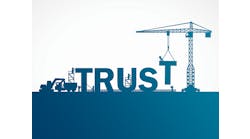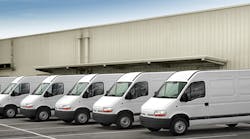As a plumbing contractor, your fleet ties up cash, is essential for making money, and represents your most important advertising tool. Here are 16 things every plumbing contractor should consider to optimize your service fleet.
1. Wrap it well: More people see your trucks than any other advertising more marketing. See your trucks as mobile billboards and invest in good wrap designs. You can read more about vehicle wraps in the November 2015 (7 Reasons to get your fleet professionally wrapped) and October 2009 (How to improve your mobile marketing) issues of CONTRACTOR magazine.
2. Go big: Because vehicles are expensive and fuel is expensive, many plumbers try to downsize their fleet as much as possible. In certain urban settings, this might even be desirable, but as a rule, use larger vehicles with larger billboards. The advertising impact will more than make up the added costs.
3. Install GPS: Make sure you use a vehicle mounted GPS system. Avoid the temptation to save money with a phone tracking approach, where the phone can be tracked to the plumber’s kitchen counter while the plumber is off performing a side job. The benefits of GPS are many. Aside from knowing where every vehicle is at all times, you can watch speeding, hard starting and stopping, track mileage, track time on the job, and so on. A GPS system will also earn a discount on insurance.
4. Block texting in motion: Distracted driving from texting is tantamount to drunk driving. There are a number of apps available that will block texting while in motion. While none of the apps are perfect, they can help eliminate the knee jerk reaction to check on an incoming text message. Add them to company phones and require them on employee phones when driving a company vehicle.
5. Consider dash cams: Long used by police, dash cams are beginning to appear in some commercial vehicles. The camera starts with the engine and streams its recording to the cloud. Dash cams can provide documentation for accidents, which is especially useful in “crash for cash” fraud schemes. They can also provide evidence to prove innocence in a ticket. If theft is a problem, rear mounted cams and be set to come on based on motion sensors, even when the vehicle is off and parked.
6. Dispatch for dollars: There are as many theories on dispatching as there are industry consultants. While dispatchers should be aware of the opportunity to optimize efficiency by reducing drive times, a more compelling case can be made to optimize revenue by matching the right plumber to the right opportunity.
The biggest hiring challenge in the industry is finding plumbers who can pass a drug test.
7. Make sure your drive home policy is legal: Different states have different laws about allowing employees to drive vehicles home. With some, an employee is on the clock the second he leaves his home. Others start the clock on the first stop for company business. Taking a vehicle home is a benefit to an employee and can save the company money, depending on state laws. Make sure you are well-versed in your state’s requirements.
8. Document your policies: All of your policies regarding vehicle and phone use should be documented in an employee handbook. Annually, remind your plumbers about the policies.
9. Inspect trucks randomly: Some contractors conduct a random inspection of a vehicle each service meeting. The plumber is provided with a checklist and a dollar bill for each item on the checklist. Each time the plumber fails an item on the checklist, he hands over a dollar. At the end of the inspection, he can keep what’s left.
10. Drug test: The biggest hiring challenge in the industry is finding plumbers who can pass a drug test. However, the risk of a plumber driving one of your vehicles while high and getting into an accident is too great to ignore drug testing on hiring, random testing, and testing following any accident.
11. Check inventory intelligently: Keeping track of truck stock drives most contractors crazy. To reduce the insanity, standardize your shelving across your fleet and map the locations of every part and tool whether company supplied or plumber supplied. Use Pareto’s Law and identify the 20% of your stock that represents 80% of the value. Check it every quarter and the rest of the truck annually.
12. Set a maintenance schedule: Identify each maintenance task you want done and give it a maintenance task number. Bid your maintenance to local shops, based on the tasks you want performed. Set a maintenance schedule based on miles and the calendar and stick to it. When the vehicle is taken in for maintenance, a P.O. should accompany it with the specific tasks identified. Any replaced parts should be put in a bag and returned. This is to help ensure only the work you want done is performed and further that the work billed is actually performed.
13. Manage appearance aggressively: Your trucks are your brand’s image in the public. They should be cleaned as often as necessary, which can be fairly frequent during the winter in cold weather locations. Not only should the external truck be cleaned, but the cab should clean and neat. Trucks are tangible indicators of the type of intangible service people can expect from your company.
14. Drive friendly: With GPS and dash cams it’s easy to identify speeding. However, these tools cannot always identify rude or aggressive driving. Stress the need for your plumbers to drive like they are company ambassadors. Indeed, they are.
15. Consider a fleet fuel card: A fleet fuel card is worth considering. They are less subject to fraud and abuse than regular credit cards. Some cards will generate discounts. Some will coordinate with a GPS, offering a superior level of reporting for mileage, fuel efficiency, amount and type of gas purchased, and so on. Be sure to set a daily limit of $100 to $150 to limit any potential liability.
16. Insurance: Fleet insurance should be shopped annually. It is easy to develop a comfortable relationship with an insurance agent and roll over the same policy, when there are lower priced options. In addition, whenever there is a spare truck, not being used, park it and cancel the insurance until it is returned to service.
Matt Michel is CEO of the Service Roundtable. For more business ideas, tips, and free downloads, visit ServiceRoundtable.com and click on the “Free Stuff” tab. For more information on the Service Roundtable, call 877/262-3341.


